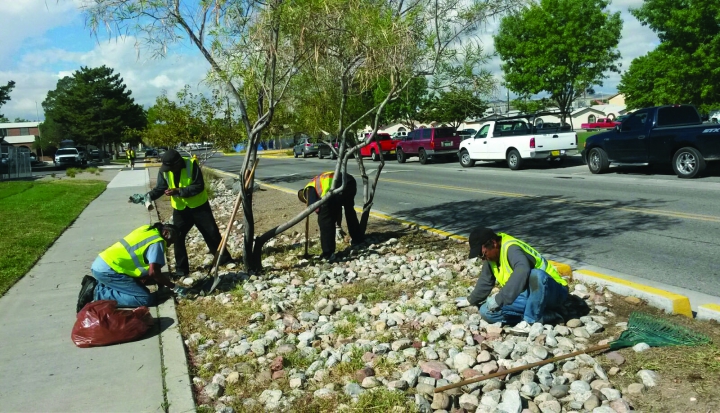It’s an uncharacteristically cloudy day in Albuquerque, New Mexico, and a haze hovers in front of the sun. At 7 a.m., William Cole is already energetic, buzzing around the parking lot of St. Martin’s Hospitality Center, Albuquerque’s largest homeless shelter, employment hub, and housing program. He’s getting ready to drive a big white Dodge van around the city, picking up panhandlers and offering them the opportunity to work for the day.
On this windy March morning, people are standing outside, waiting expectantly to see Cole and his van. Cole skillfully maneuvers through morning commuter traffic in downtown Albuquerque, picking up his first group at the post office at the corner of Broadway and Mountain, just a few blocks from St. Martin’s. Four people get in, rushing up to the van in order to secure their spaces. Cole hops out and fist-bumps them each in turn—“Hi, sir; good morning, ma’am”—loading any of their personal belongings in the back.
Five minutes later, he’s stopped in the Econo Lodge parking lot in the shadow of Interstate 25. A posse of three people hop in, then a few more come jogging over from the other side of Central Avenue, Albuquerque’s main drag. The van’s at capacity now with 10 workers. The radio’s playing a morning chat show, and participants talk to each other. There’s a low hum in the back rows, while Cole swaps stories with a young man in the front seat. Cole tells everyone to call him Will.
There’s A Better Way, a program that has operated since September 2015, brings an innovative solution to the problem of panhandling and homelessness in Albuquerque. In a city fraught with conflict between the homeless population, the police, and the community (James Boyd, a man suffering from schizophrenia and homelessness, was shot and killed by police officers there in 2014), the program offers people experiencing homelessness dignity, respect, and the opportunity to earn money. Under There’s A Better Way, nearly a dozen people per day become city workers. They receive $9 an hour, as well as breakfast, lunch, and connection to services that get them back on their feet. The program runs twice a week, on Tuesdays and Thursdays, and is supervised by Cole.
Read more















Add comment